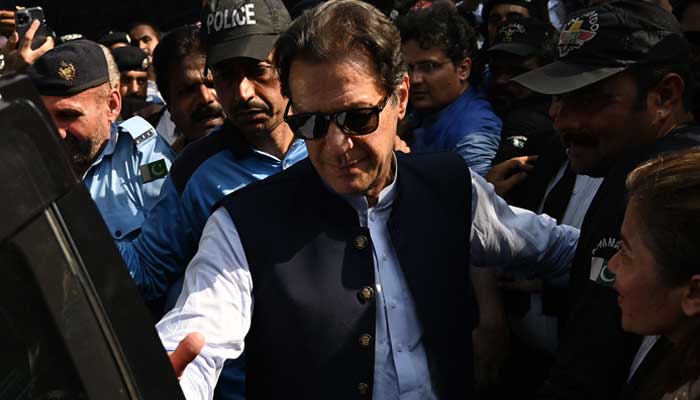- Islamabad court accepts Imran Khan’s plea for exemption.
- Hearing of Toshakhana case adjourned till April 29.
- Khan’s lawyers challenged admissibility of Toshakhana case.
ISLAMABAD: Pakistan Tehreek-e-Insaf (PTI) Chairman Imran Khan was granted relief in the Toshakhana case by an Islamabad local court as he skipped the proceedings once again on Thursday.
The former prime minister is facing charges of corrupt practices related to the state gift depository — the allegation he denies.
In October last year, Khan was barred from holding public office after the Election Commission of Pakistan (ECP) found him guilty of unlawfully selling gifts from foreign dignitaries and heads of state.
The trial court had issued an arrest warrant for the PTI chief earlier this month due to his continuous absence, despite summons for indictment in the case.
The order of arrest, however, was canceled by the trial court a few days later, over PTI’s insistence that Khan’s life was in danger and he needed security. The court had adjourned the hearing till today (March 30) and ordered Khan to ensure his presence.
Additional sessions judge Zafar Iqbal of a district and sessions court in Islamabad was presiding over the hearing.
At the outset of the hearing, Khan’s lawyers filed a request for exemption from today’s hearing, maintaining that there was still a strike at the Islamabad Bar which had been going on for the last three days.
At this, the Election Commission of Pakistan’s lawyer, Amjad Pervez, said that Imran Khan is not part of the lawyers’ strike.
“At the trial stage, the presence of the suspect in the courtroom is required. Imran Khan should come even if his lawyers want to go on strike,” he argued.
Khan’s lawyer Khawaja Harris responded that the PTI chief’s life is in danger and that the government has withdrawn security from him. “The chief justice of Islamabad has asked for a report on the withdrawal of Imran Khan’s security,” he said, arguing that an appearance in court can also be made through a video link.
“So the request for exemption from the presence of Imran Khan should be approved, however, others will continue with the court proceedings,” he said.
After the arguments of the lawyers, the judge asked the parties to help the court decide on the hearing through joint consultation. At this, PTI chief’s lawyer Faisal Chaudhry said that the next hearing of the Toshakhana case should be held after Ramadan. “Is there a hurry?” he asked.
The judge instructed the concerned parties to consult, saying the court had already convened at 8:30am.
Harris proposed to adjourn the hearing for two weeks, at which the court adjourned further proceedings till April 29 and accepted Imran Khan’s request for exemption from today’s attendance.
Apart from this, a plea has also been filed on behalf of Imran Khan challenging the admissibility of the Toshakhana case and arguments for it will be given at the next hearing.
What is the Toshakhana case?
Under the rules governing “Toshakhana” — a Persian word meaning “treasure house” — government officials can keep gifts if they have a low worth, while they must pay a dramatically reduced fee to the government for extravagant items.
The Toshakhana is under a microscope ever since the emergence of the allegations that Imran Khan purchased the gifts he received as prime minister at throwaway rates and sold them off in the open market for staggering profits.
The 70-year-old cricketer-turned-politician was accused of misusing his 2018 to 2022 premiership to buy and sell gifts in state possession that were received during visits abroad and worth more than Rs140 million ($635,000).
The gifts included watches given by a royal family, according to government officials, who have alleged previously that Khan’s aides sold them in Dubai.
The gifts included seven wristwatches, six made by watchmaker Rolex, and the most expensive a “Master Graff limited edition” valued at 85 million Pakistani rupees ($385,000).
The election commission’s order had said Imran stood disqualified under Article 63(1)(p) of the Constitution.
Following the order, the election watchdog moved the Islamabad sessions court and sought criminal proceedings against him — and the PTI chief has missed several hearings.


 Latest News3 days ago
Latest News3 days ago
 Latest News3 days ago
Latest News3 days ago
 Entertainment3 days ago
Entertainment3 days ago
 Latest News3 days ago
Latest News3 days ago
 Latest News3 days ago
Latest News3 days ago
 Latest News3 days ago
Latest News3 days ago
 Latest News3 days ago
Latest News3 days ago
 Latest News3 days ago
Latest News3 days ago























